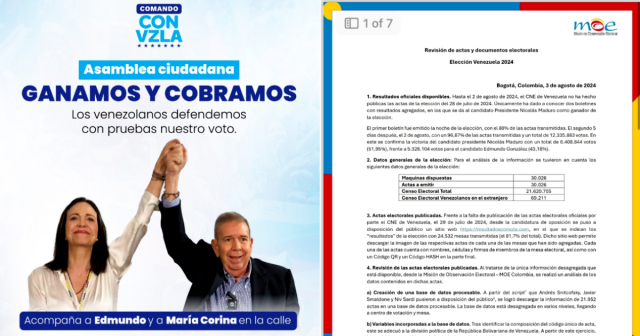The ruler Nicolás Maduro took advantage of his speech before the Chavistas who gathered in Caracas this Saturday to boast about his hardline stance against the protesters who are demonstrating against the fraud committed in the recent elections in Venezuela.
With the repression unleashed against the followers of leader María Corina Machado and candidate Edmundo González Urrutia, social networks have reflected the raids organized by the Bolivarian National Guard (GNB) and the regime's intelligence service (SEBIN).
Groups of repressors on motorcycles, in uniform or plain clothes, have been recorded chasing and beating protesters, especially young people. Gunfire into the air, opposition homes marked in the purest Nazi style, and other misdeeds have been documented by activists and Venezuelan citizens.
Reports from international organizations state that the repression has already cost more than 20 lives of people executed by Maduro's hitmen, while dozens of disappearances are reported and more than 2,000 detentions have occurred.
Without any shame and bragging like a schoolyard bully, the dictator who inherited power from Hugo Chávez confirmed this last point and warned that "this time there will be no forgiveness."
"We have 2,000 captured prisoners and from there they go to Tocorón and Tocuyito [maximum security prisons of the regime, located in the states of Aragua and Carabobo respectively]," Maduro revealed with an affected strongman voice.
Cheered and applauded by his supporters, the dictator demanded "the maximum punishment" for those detained and stated that "this time there will be no forgiveness... this time what there will be is Tocorón."
"Everyone confesses, everyone, because there has been a strict, legal process directed by the Attorney General of the Republic, with full guarantees, and everyone is convicted and confessing," Maduro stated, accusing the detainees of being fascists trained to burn polling centers, as well as regional offices of the National Electoral Council (CNE) and other alleged terrorist acts.
According to the self-proclaimed president, the repressive operation is being carried out efficiently thanks to the "civic-military-police union" on which his regime of terror is based, which is despised by the vast majority of Venezuelans, according to the records of the elections presented by the opposition.
Aware of his growing unpopularity and the exhaustion of an autocratic model imported and advised from Havana, dictator Maduro threatens to use violence long before the elections are held.
"If you don't want Venezuela to fall into a bloodbath, and a fratricidal civil war as a result of the fascists, let's guarantee the greatest success, the greatest electoral victory in the history of our people," shouted the ruler on July 17 during a rally held in La Vega, Caracas.
The threats from the Chavista leader alarmed half the world, from Brazilian President Lula da Silva to U.S. Secretary of State Antony Blinken. The latter had a phone conversation on Friday with González Urrutia and Machado, expressing his concern for both of their safety.
During the call, Blinken congratulated González Urrutia for receiving the majority of votes in the elections held on July 28 and expressed his concern for the well-being of the opposition leaders.
On the same day as Blinken's call, María Corina Machado's party, Vente Venezuela, reported an attack on its headquarters in Caracas. Six armed men broke into the place, overpowering the guards and taking equipment and documents.
In a column published in The Wall Street Journal, Machado expressed her fear for her life, stating that she could be captured at any moment.
The Venezuelan opposition published 81% of the electoral records on a website, claiming that González Urrutia won the presidency by a wide margin.
This electoral fraud allegation has triggered numerous protests across the country, resulting in at least 20 dead, including one military personnel, and more than 2,000 detained.
Seventy-two hours after the fraudulent elections, the Organization of American States (OAS) requested the International Criminal Court (ICC) to issue an arrest warrant against Maduro.
The petition, led by the Secretary General of the OAS, Luis Almagro, was based on allegations of crimes against humanity allegedly committed by Maduro by ordering the repression of protesters following the elections.
In an extraordinary session of the Permanent Council of the OAS in Washington, Almagro argued that the time for justice for Venezuela had come, and a draft resolution was presented that required the Venezuelan government to show the results of the elections.
However, the OAS was unable to reach a consensus to pressure Venezuelan authorities. Among the countries that abstained from the resolution were Brazil and Colombia, whose leaders had previously requested transparency from the authorities in Caracas.
Mexico had anticipated that it would not be present. In total, there were 17 members of the OAS Permanent Council who voted in favor, 11 abstained, and five were absent, including Trinidad and Tobago and Venezuela itself. It is worth noting that there were no votes against.
What do you think?
COMMENTFiled under:
